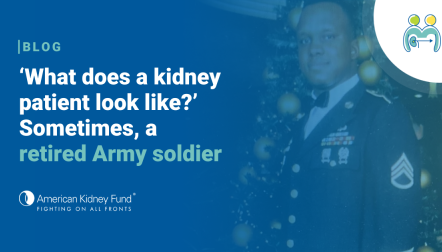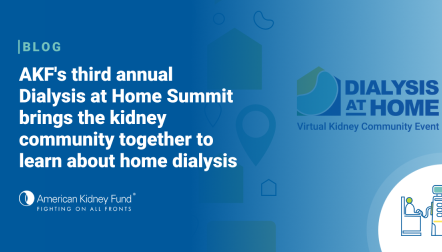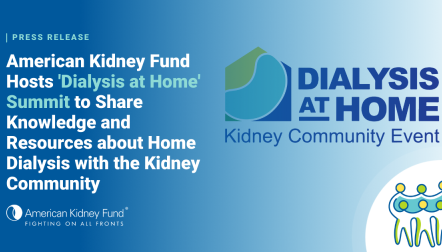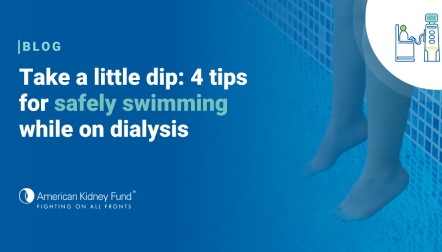
Blog post
Thriving on your terms: Dialysis at Home Summit emphasizes the benefits of managing kidney disease on home dialysis

The American Kidney Fund (AKF) and Home Dialyzors United(HDU) partnered for a second year in a row to host the annual Dialysis at Home: Kidney Community Event on Thursday, Sept. 14. This virtual and free event connected people across the kidney community, including patients, caregivers, nephrologists and others, to learn about the latest updates, tools and resources to help individuals advocate for their best care while managing kidney disease on home dialysis.
Increasing awareness and utilization of home dialysis is one of the pillars of AKF's Kidney Health for All initiative, which focuses on improving health equity in kidney disease, particularly for people from racial and ethnic minority groups who are most disproportionately affected by end stage renal disease.
Nearly 1,640 people registered for the Dialysis at Home: Kidney Community Event, which included eight sessions, three patient panels, a sponsor showcase and expo booth.
The theme for this year's summit was "Thriving on Your Terms," emphasizing that anyone can be an ideal candidate for home dialysis with motivation and support, and they can live their lives on their own terms. AKF President and CEO LaVarne Burton and Home Dialyzors United Executive Director Nieltje Gedney spoke about the theme during a fireside chat opening the summit.
"You have to find what matters to you and then how you can fit your dialysis into your life, not life into your dialysis," Nieltje said.
Sadly, Nieltje passed away days after the virtual summit. Her work on behalf of people with kidney disease, and her efforts to increase awareness of home dialysis, will always be remembered.
All of the summit sessions are available for replay. Here are highlights from select sessions:
Patient Advocate Panel: To Each Their Own — Four Different Dialysis Paths
Although dialysis saves many lives, it is not a one-size-fits-all treatment. This panel featured four dynamic panelists who shared their unique journeys with kidney disease. They spoke about their experiences doing home dialysis, including peritoneal dialysis, and delaying dialysis through lifestyle changes. They also shared that it is important for people with kidney failure to listen to their bodies and research on their own to ensure that they are comfortable with the dialysis modality that is offered to them and that they wind up choosing.
AKF recently developed the Home Dialysis Decision Aid, a new tool that can help people with kidney disease, their loved ones and doctors make health care decisions together. Using this decision aid tool will help you learn more about home dialysis and provide information to better understand options and choose the best dialysis treatment for you — all based on the lifestyle factors that you value the most.
It Takes a Village: Being Successful at Home
Each member of your dialysis care team has an essential role in helping you meet your health care needs. In this panel, participants heard from some of the common players on a dialysis care team, such as a home dialysis nurse, renal dietitian, social worker, nephrologist and care partner. Jennifer Moore, a registered dietitian who has served the renal population for more than 20 years, and Jen Ravert, a registered nurse who specializes in home dialysis modalities and teaches it to all her patients, discussed their unique roles and how they work together to make sure their patients have the best experience. They also discussed how to identify the roles of each member on your care team, as well as how to exercise patience, even during times of uncertainty.
Navigating Challenges: Q&A With Patient Advocate
About 130,000 people in the U.S. were newly diagnosed with kidney failure in 2020, but the experiences of people living with CKD can vary greatly. In this session, Erich Ditschman, an experienced home hemodialysis advocate, and David Rush, our summit emcee, answered questions and shared their personal journeys on what it takes to be successful at home.
Erich and David made it clear that quality of life is key. They also answered questions from participants about self-cannulation (inserting your own needles for dialysis) and emphasized that while it can feel intimidating at first, with training and practice it can become a more comfortable experience.
'Dialysis at Home: Kidney Community Event' was made possible by the generosity of Leading Sponsor Outset Medical (sponsoring the panel "It Takes a Village: Being Successful at Home") and Exhibit sponsors Ardelyx, Inc., AstraZeneca, Baxter International Inc., NxStage Medical Inc., TNT Moborg International Ltd and U.S. Renal Care.





